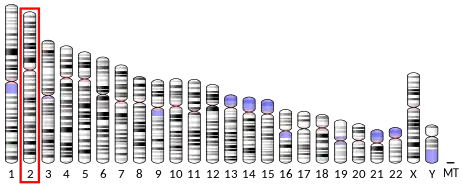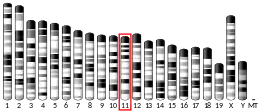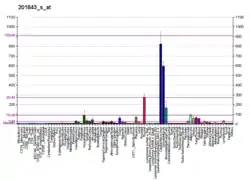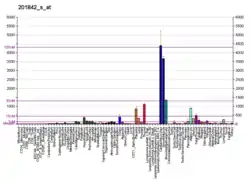EFEMP1
EGF-containing fibulin-like extracellular matrix protein 1 is a protein that in humans is encoded by the EFEMP1 gene.[5][6][7]
| EFEMP1 | |||||||||||||||||||||||||||||||||||||||||||||||||||
|---|---|---|---|---|---|---|---|---|---|---|---|---|---|---|---|---|---|---|---|---|---|---|---|---|---|---|---|---|---|---|---|---|---|---|---|---|---|---|---|---|---|---|---|---|---|---|---|---|---|---|---|
| Identifiers | |||||||||||||||||||||||||||||||||||||||||||||||||||
| Aliases | EFEMP1, DHRD, DRAD, FBLN3, FBNL, FIBL-3, MLVT, MTLV, S1-5, EGF containing fibulin like extracellular matrix protein 1, EGF containing fibulin extracellular matrix protein 1 | ||||||||||||||||||||||||||||||||||||||||||||||||||
| External IDs | OMIM: 601548 MGI: 1339998 HomoloGene: 3028 GeneCards: EFEMP1 | ||||||||||||||||||||||||||||||||||||||||||||||||||
| |||||||||||||||||||||||||||||||||||||||||||||||||||
| |||||||||||||||||||||||||||||||||||||||||||||||||||
| |||||||||||||||||||||||||||||||||||||||||||||||||||
| |||||||||||||||||||||||||||||||||||||||||||||||||||
| Wikidata | |||||||||||||||||||||||||||||||||||||||||||||||||||
| |||||||||||||||||||||||||||||||||||||||||||||||||||
Gene
This gene encodes a member of the fibulin family of extracellular matrix glycoproteins. Like all members of this family, the encoded protein contains tandemly repeated epidermal growth factor-like repeats followed by a C-terminus fibulin-type domain. This gene is upregulated in malignant gliomas and may play a role in the aggressive nature of these tumors. Mutations in this gene are associated with Doyne honeycomb retinal dystrophy and with predisposition to hernias. Alternatively spliced transcript variants that encode the same protein have been described.[provided by RefSeq, Nov 2009]. This gene spans approximately 18 kb of genomic DNA and consists of 12 exons. Alternative splice patterns in the 5' UTR result in three transcript variants encoding the same extracellular matrix protein.[7]
Clinical significance
Mutations in this gene are associated with Doyne honeycomb retinal dystrophy and with predisposition to hernias.[7][8]
EFEMP1/Fibulin-3 has recently been reported as a potential biomarker to facilitate the identification of patients with pleural mesothelioma.[9]
References
- GRCh38: Ensembl release 89: ENSG00000115380 - Ensembl, May 2017
- GRCm38: Ensembl release 89: ENSMUSG00000020467 - Ensembl, May 2017
- "Human PubMed Reference:". National Center for Biotechnology Information, U.S. National Library of Medicine.
- "Mouse PubMed Reference:". National Center for Biotechnology Information, U.S. National Library of Medicine.
- Ikegawa S, Toda T, Okui K, Nakamura Y (Dec 1996). "Structure and chromosomal assignment of the human S1-5 gene (FBNL) that is highly homologous to fibrillin". Genomics. 35 (3): 590–2. doi:10.1006/geno.1996.0402. PMID 8812496.
- Lecka-Czernik B, Lumpkin CK Jr, Goldstein S (Jan 1995). "An overexpressed gene transcript in senescent and quiescent human fibroblasts encoding a novel protein in the epidermal growth factor-like repeat family stimulates DNA synthesis". Mol Cell Biol. 15 (1): 120–8. doi:10.1128/mcb.15.1.120. PMC 231918. PMID 7799918.
- "Entrez Gene: EFEMP1 EGF-containing fibulin-like extracellular matrix protein 1".
- Jorgenson, E.; Makki, N.; Shen, L.; Chen, D. C.; Tian, C.; Eckalbar, W. L.; Hinds, D.; Ahituv, N.; Avins, A. (2015). "A genome-wide association study identifies four novel susceptibility loci underlying inguinal hernia - PubMed". Nature Communications. 6: 10130. doi:10.1038/ncomms10130. PMC 4703831. PMID 26686553.
- Pass HI, Levin SM, Harbut MR, Melamed J, Chiriboga L, Donington J, Huflejt M, Carbone M, Chia D, Goodglick L, Goodman GE, Thornquist MD, Liu G, de Perrot M, Tsao MS, Goparaju C (October 2012). "Fibulin-3 as a blood and effusion biomarker for pleural mesothelioma". N. Engl. J. Med. 367 (15): 1417–27. doi:10.1056/NEJMoa1115050. PMC 3761217. PMID 23050525.
- Yuryev A, Wennogle LP (February 2003). "Novel raf kinase protein-protein interactions found by an exhaustive yeast two-hybrid analysis". Genomics. 81 (2): 112–25. doi:10.1016/S0888-7543(02)00008-3. PMID 12620389.
Further reading
- Héon E, Piguet B, Munier F, et al. (1996). "Linkage of autosomal dominant radial drusen (malattia leventinese) to chromosome 2p16-21". Arch. Ophthalmol. 114 (2): 193–8. doi:10.1001/archopht.1996.01100130187014. PMID 8573024.
- Bonaldo MF, Lennon G, Soares MB (1997). "Normalization and subtraction: two approaches to facilitate gene discovery". Genome Res. 6 (9): 791–806. doi:10.1101/gr.6.9.791. PMID 8889548.
- Stone EM, Lotery AJ, Munier FL, et al. (1999). "A single EFEMP1 mutation associated with both Malattia Leventinese and Doyne honeycomb retinal dystrophy". Nat. Genet. 22 (2): 199–202. doi:10.1038/9722. PMID 10369267. S2CID 5613181.
- Giltay R, Timpl R, Kostka G (2000). "Sequence, recombinant expression and tissue localization of two novel extracellular matrix proteins, fibulin-3 and fibulin-4". Matrix Biol. 18 (5): 469–80. doi:10.1016/S0945-053X(99)00038-4. PMID 10601734.
- Katsanis N, Venable S, Smith JR, Lupski JR (2000). "Isolation of a paralog of the Doyne honeycomb retinal dystrophy gene from the multiple retinopathy critical region on 11q13". Hum. Genet. 106 (1): 66–72. doi:10.1007/s004390051011. PMID 10982184.
- Sauer CG, White K, Kellner U, et al. (2001). "EFEMP1 is not associated with sporadic early onset drusen". Ophthalmic Genet. 22 (1): 27–34. doi:10.1076/opge.22.1.27.2239. PMID 11262647. S2CID 31867997.
- Matsumoto M, Traboulsi EI (2001). "Dominant radial drusen and Arg345Trp EFEMP1 mutation". Am. J. Ophthalmol. 131 (6): 810–2. doi:10.1016/S0002-9394(00)00926-0. PMID 11384588.
- Tarttelin EE, Gregory-Evans CY, Bird AC, et al. (2001). "Molecular genetic heterogeneity in autosomal dominant drusen". J. Med. Genet. 38 (6): 381–4. doi:10.1136/jmg.38.6.381. PMC 1734899. PMID 11389162.
- Marmorstein LY, Munier FL, Arsenijevic Y, et al. (2002). "Aberrant accumulation of EFEMP1 underlies drusen formation in Malattia Leventinese and age-related macular degeneration". Proc. Natl. Acad. Sci. U.S.A. 99 (20): 13067–72. Bibcode:2002PNAS...9913067M. doi:10.1073/pnas.202491599. PMC 130587. PMID 12242346.
- Guymer RH, McNeil R, Cain M, et al. (2003). "Analysis of the Arg345Trp disease-associated allele of the EFEMP1 gene in individuals with early onset drusen or familial age-related macular degeneration". Clin. Experiment. Ophthalmol. 30 (6): 419–23. doi:10.1046/j.1442-9071.2002.00572.x. PMID 12427233. S2CID 11949463.
- Strausberg RL, Feingold EA, Grouse LH, et al. (2003). "Generation and initial analysis of more than 15,000 full-length human and mouse cDNA sequences". Proc. Natl. Acad. Sci. U.S.A. 99 (26): 16899–903. Bibcode:2002PNAS...9916899M. doi:10.1073/pnas.242603899. PMC 139241. PMID 12477932.
- Yuryev A, Wennogle LP (2003). "Novel raf kinase protein-protein interactions found by an exhaustive yeast two-hybrid analysis". Genomics. 81 (2): 112–25. doi:10.1016/S0888-7543(02)00008-3. PMID 12620389.
- Blackburn J, Tarttelin EE, Gregory-Evans CY, et al. (2003). "Transcriptional regulation and expression of the dominant drusen gene FBLN3 (EFEMP1) in mammalian retina". Invest. Ophthalmol. Vis. Sci. 44 (11): 4613–21. doi:10.1167/iovs.03-0112. PMID 14578376.
- Ota T, Suzuki Y, Nishikawa T, et al. (2004). "Complete sequencing and characterization of 21,243 full-length human cDNAs". Nat. Genet. 36 (1): 40–5. doi:10.1038/ng1285. PMID 14702039.
- Klenotic PA, Munier FL, Marmorstein LY, Anand-Apte B (2004). "Tissue inhibitor of metalloproteinases-3 (TIMP-3) is a binding partner of epithelial growth factor-containing fibulin-like extracellular matrix protein 1 (EFEMP1). Implications for macular degenerations". J. Biol. Chem. 279 (29): 30469–73. doi:10.1074/jbc.M403026200. PMID 15123717.
- Gerhard DS, Wagner L, Feingold EA, et al. (2004). "The status, quality, and expansion of the NIH full-length cDNA project: the Mammalian Gene Collection (MGC)". Genome Res. 14 (10B): 2121–7. doi:10.1101/gr.2596504. PMC 528928. PMID 15489334.
- Yáñez AJ, Bertinat R, Spichiger C, et al. (2005). "Novel expression of liver FBPase in Langerhans islets of human and rat pancreas". J. Cell. Physiol. 205 (1): 19–24. doi:10.1002/jcp.20407. hdl:10533/176131. PMID 15965961. S2CID 40822845.
- Rual JF, Venkatesan K, Hao T, et al. (2005). "Towards a proteome-scale map of the human protein-protein interaction network". Nature. 437 (7062): 1173–8. Bibcode:2005Natur.437.1173R. doi:10.1038/nature04209. PMID 16189514. S2CID 4427026.
- Hu B, Thirtamara-Rajamani KK, Sim H, Viapiano MS (November 2009). "Fibulin-3 is uniquely upregulated in malignant gliomas and promotes tumor cell motility and invasion". Mol. Cancer Res. 7 (11): 1756–70. doi:10.1158/1541-7786.MCR-09-0207. PMC 3896096. PMID 19887559.





